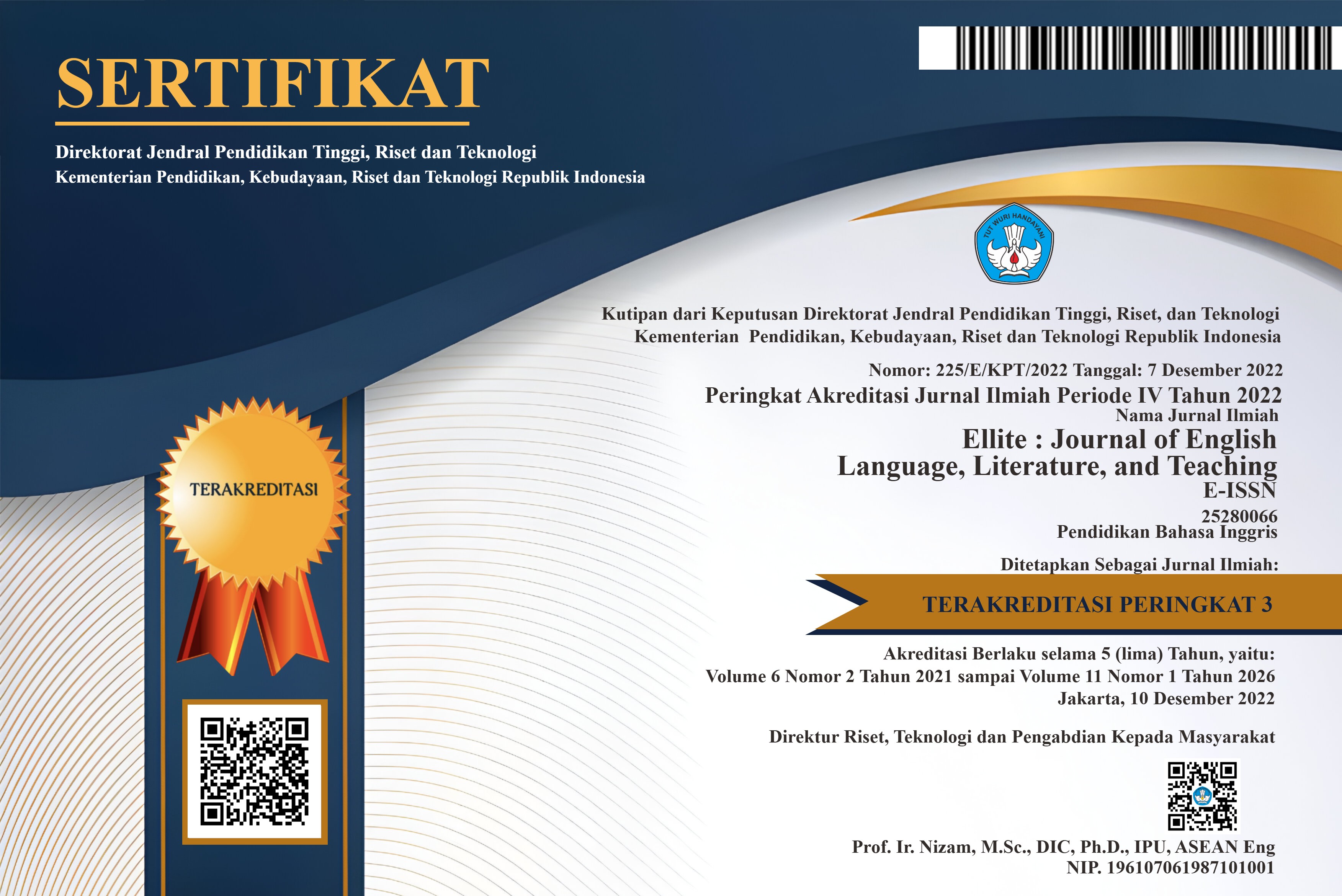Effectiveness of Using Drops Application in English Vocabulary on Students’ Learning Outcomes
DOI:
https://doi.org/10.32528/ellite.v10i1.3152Keywords:
vocabulary, Drops Application, Learning OutcomesAbstract
The study aims to determine the effect of using an English vocabulary learning application called "Drops" as a tool in helping English as foreign language. This app was designed to be installed into smartphones with Android and IOS System. This study uses a quasi-experimental design, with as many as 30 students in the experimental group who study with the Drops application and 30 students in the control group who use conventional textbook based learning methods. Data were collected through test vocabulary with pretest and post-test to assess the effect of the using this app on vocabulary learning in junior high school in Deli Serdang. The results of the statistical analysis showed that there was a significant increase in vocabulary learning outcomes in the experimental group compared to the control group (p<0.05). At the conclusion of the study, researcher realized that the use of the Drops application significantly improves students' vocabulary learning outcomes. The combination of gamification, visual learning, and micro-learning in Drops enhances engagement and retention, making vocabulary learning more effective and suggesting that digital applications can serve as valuable tools in language education.
References
Alqahtani, M. (2015). The importance of vocabulary in language learning and how to be taught. International journal of teaching and education, 3(3), 21-34. https://doi.org/10.20472/TE.2015.3.3.002
Cahanaya, T. A., Taufiqulloh, & Sulistyawati, A. E. (2022). The use of “Drops” application and its effect on students’ vocabulary achievement. Pancasakti International Seminar on English Language Teaching Universitas Pancasakti Tegal. http://repository.upstegal.ac.id/id/eprint/5399
Campbell, D. T., & Stanley, J. C. (1963). Experimental and quasi-experimental designs for research. Houghton Mifflin.
Chiu, T. K. F. (2021). Applying the self-determination theory (SDT) to explain student engagement in online learning during the COVID-19 pandemic. Journal of Research on Technology in Education, 53(1), 1-17. https://doi.org/10.1080/15391523.2021891998
Darsih, E., & Asikin, N. A. (2020). Mobile Assisted Language Learning: EFL Learners’ Perceptions Toward The Use of Mobile Application in Learning English. Journal of English Education, 8(2), 183–194. https://doi.org/10.25134/erjee.v8i2.2999.Received
Daulay, S. H., Ramadhan, A., & Wahyuni, S. (2023). Quizizz application in students learning outcomes: Teachers and students' perception. Modality Journal: International Journal of Linguistics and Literature, 3(2). https://doi.org/10.30983/mj.v3i2.6719
Debataraja, C. S., & Daulay, S. H. (2024). The effectiveness of Rosetta Stone as media to increase vocabulary skill in EFL senior high school. Jurnal Ilmu Pendidikan STKIP Kusuma Negara, 15(2). https://doi.org/10.37640/jip.v15i2.1846
EF English Proficiency Index. (2023). EF EPI: English proficiency index – Indonesia ranking. Retrieved from https://www.ef.com/epi/
Fitriyani, E., & Nulanda, P. Z. (2017). Efektivitas Media Flash Cards dalam Meningkatkan Kosakata Bahasa Inggris. Psympathic : Jurnal Ilmiah Psikologi, 4(2), 167–182. https://doi.org/10.15575/psy.v4i2.1744
Hung, H. T. (2018). Gamifying the flipped classroom using game-based learning materials. ELT Journal, 72(3), 296–308
Irawan, A., Wilson, A., & Sutrisno, S. (2020). The Implementation of Duolingo Mobile Application in English Vocabulary Learning. Scope : Journal of English Language Teaching, 5(1), 08. https://doi.org/10.30998/scope.v5i1.656
Malone, J. (2018). Incidental Vocabulary Learning in SLA. Studies in Second Language Acquisition, 1–25. https://doi.org/10.1017/S0272263117000341
Mustakim. (2020). Efektivitas Pembelajaran Daring Menggunakan Media Online Selama Pandemi Covid-19 pada Mata Pelajaran Matematika. Al Asma: Journal of Islamic Education 2(1).
Najmi, K., & Naserbakht, M. (2021). The effect of "Drops" application as gaming on vocabulary learning of Iranian EFL young learners. Journal of new advances in English Language Teaching and Applied Linguistics, 3(1), 518-533. 10.22034/JELTAL.2021.286888.1038
Krathwohl, D. R. (2002). "A revision of Bloom's taxonomy: An overview." Theory Into Practice, 41(4), 212-218.
Paivio, A. (1986). Mental representations: A dual coding approach. Oxford University Press.
Patahuddin, P., Syawal, S., & Bin-Tahir, S. (2017). Investigating Indonesian EFL learners’ learning and acquiring English vocabulary. International Journal of English Linguistics, 7(4), 128-137. http://doi.org/10.5539/ijel.v7n4p128
Puspitasari, H., Maharani, R. F., Setyawan, W. H., & Primasari, Y. (2022). Android-Based Mobile Application for Vocabulary Learning. Jurnal Pendidikan Dan Pengajaran, 55(3), 469–479. https://doi.org/10.23887/jpp.v55i3.40661
Rahman, A. (2021). "Digital literacy and English language learning in Indonesia." Indonesian Journal of Applied Linguistics, 11(2), 231-243.
Rahmandika, M. G., Rachmawati, D., Rima, R. (2023). “Teaching English Vocabulary by Using Mobile Application “Drops” For Senior High School”. PROCEEDING AISELT (Annual International Seminar on English Language Teaching), 8(1), 228-239. https://jurnal.untirta.ac.id/index.php/aiselt
Rivers, W. M. (2018). Teaching foreign language skills. University of Chicago Press.
Sailer, M., & Homner, L. (2020). Gamifikasi pembelajaran: Sebuah meta-analisis. Educational Psychology Review, 32 (1), 77–112. https://doi.org/10.1007/s10648-019-09498-w
Selwyn, N. (2016). Education and technology: Key issues and debates (2nd ed.). Bloomsbury Publishing.
Vygotsky, L. S. (1978). Mind in society: The development of higher psychological processes. Harvard University Press.
Wahyuningsih, E. (2024). A systematic review: The use of mobile language learning apps to improve vocabulary. Journal of English Education, Literature, and Linguistics, 5(1), 10–20. https://jurnal.untan.ac.id/index.php/JEFLE/article/view/82996
Wandini, R. R., Damanik, E. S. D., Daulay, S. H., & Iskandar, W. (2021). The effect of snake and ladder game on student learning outcomes in studying of Islamic history "Fathu Mecca" at the elementary school Muhammadiyah, North Sumatra, Indonesia. Al-Bidayah: Jurnal Pendidikan Dasar Islam, 13(1), 169-180. https://doi.org/10.14421/al-bidayah.v13i1.637
Wang, A. I., & Tahir, R. (2020). The effect of using Kahoot! for learning – A literature review. Computers & Education, 149, 103818. https://doi.org/10.1016/j.compedu.2020.103818
Webb, S., & Nation, P. (2017). "How vocabulary is learned." Oxford University Press.
Yasin, Y., & La Sitiha, H. I. (2021). The Implementation of Vocabulary Trees to Enhance Students’ Vocabulary Achievement. Seltics, 4(1), 44–52. https://doi.org/10.46918/seltics.v4i1.746
Downloads
Published
Issue
Section
Categories
License
Copyright (c) 2025 Sonia Sabilla, Sholihatul Hamidah Daulay

This work is licensed under a Creative Commons Attribution 4.0 International License.







